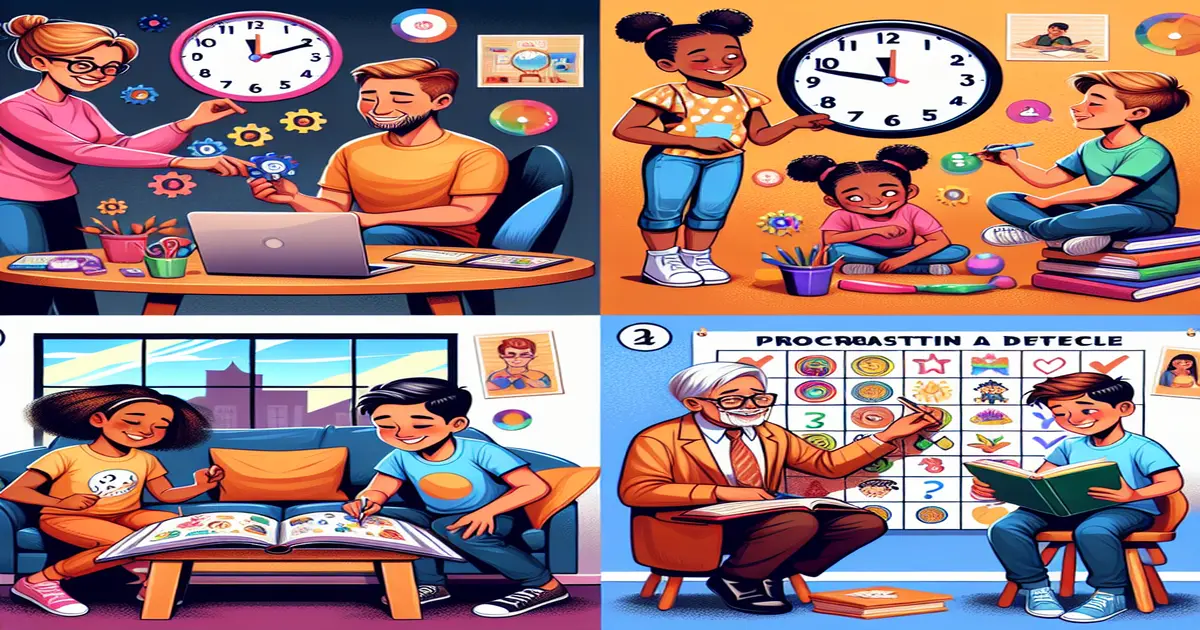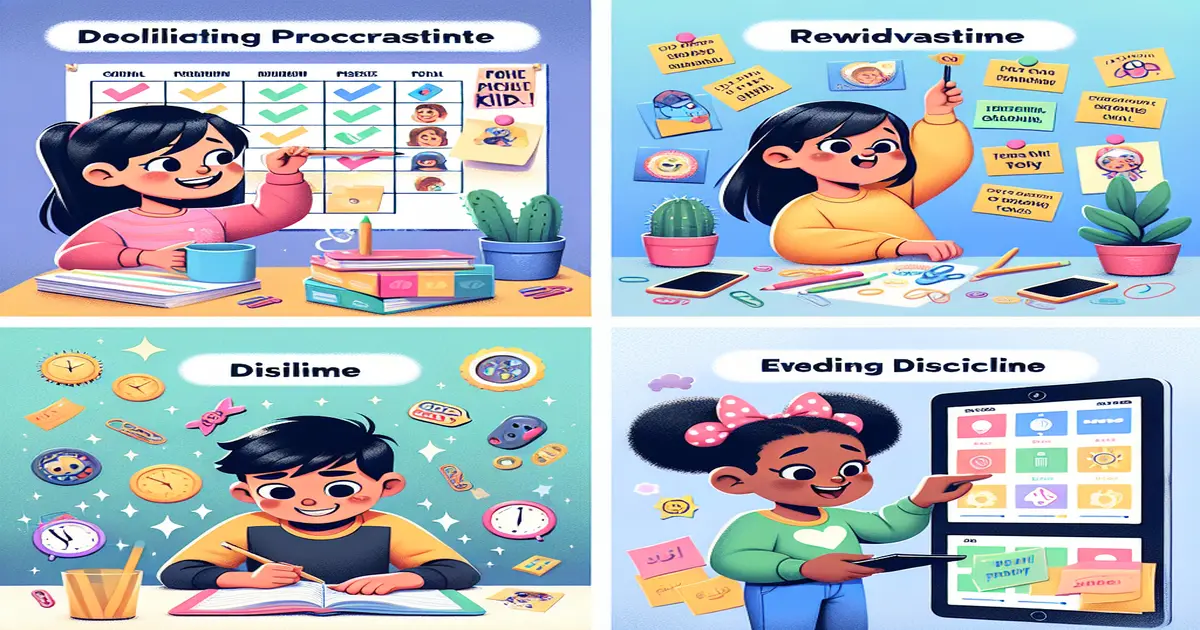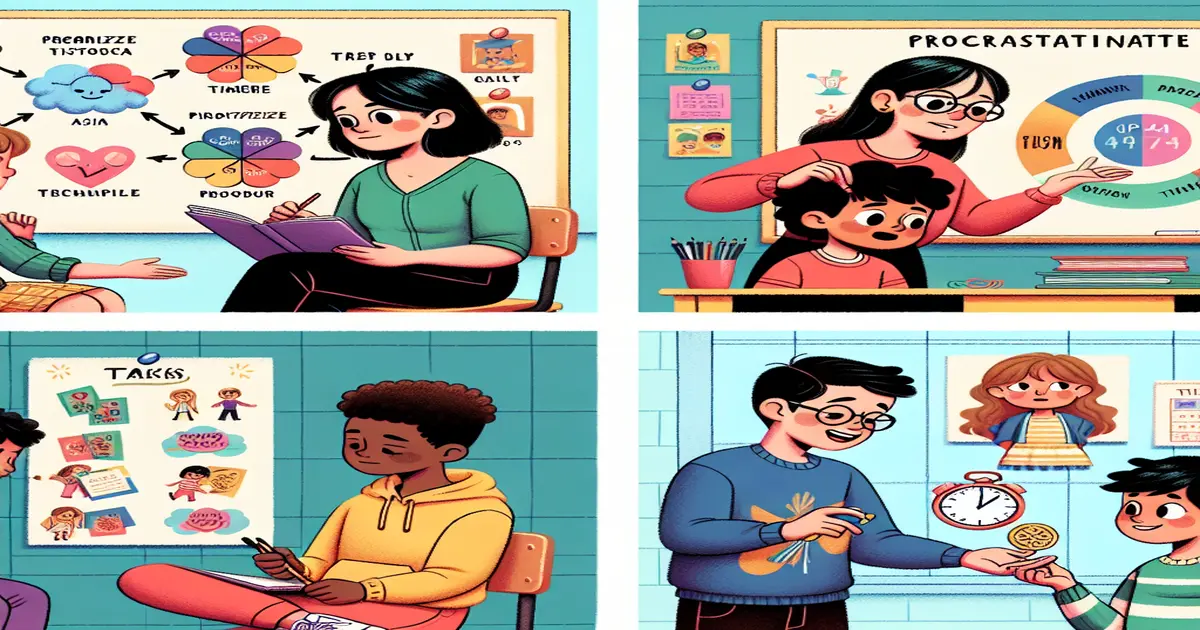Teaching children independence and responsibility is crucial for their growth, but it can be challenging when they procrastinate. Parents often hear excuses like “I don’t want to” or “I’ll do that later,” which can be frustrating. This blog post aims to provide practical strategies for parents to help their children overcome procrastination.

What Does Procrastination Look Like at Different Ages?
Preschoolers (Ages 2-4)
At this age, delaying household routines like cleaning up toys, getting dressed, or even brushing teeth is quite common among preschoolers. You might often hear phrases like “I don’t want to” or “I’m busy” as they express their preferences.
These young children are still in the early stages of learning how to follow a routine, and their natural inclination is to prioritize playtime over chores. Their understanding of time management is limited, and they often need guidance and encouragement to complete simple tasks.

Older Preschoolers (Ages 5-6)
Older preschoolers start encountering more tasks and responsibilities, such as early schoolwork, small household chores, or following bedtime routines. They may begin using phrases like “I’ll do that later,” which may indicate a shift in their approach to procrastination.
While they have a basic understanding of what needs to be done, they still struggle with prioritizing different tasks and managing their time effectively. At this stage, it’s helpful to introduce concepts of time and simple rewards to motivate them to complete their duties.
Elementary and Middle-School Children (Ages 7-13)
Academic procrastination becomes more pronounced in elementary and middle-school children as they face increasing academic demands. They often leave tasks such as homework, school projects, or studying for tests until the last minute, which can cause stress and anxiety.
This age group is more likely to procrastinate due to numerous distractions from entertainment, social activities, and a lack of developed time management skills. Teaching them organizational techniques and creating structured schedules can help mitigate these tendencies.
High School Teens (Ages 14-18)
In high school, new priorities, such as socializing, part-time jobs, and extracurricular activities, begin to dominate their lives. Many teens lack strong time management skills and intrinsic motivation, leading to chronic procrastination. They might put off important tasks, such as studying for exams or completing college applications, which can negatively impact their academic performance and future opportunities.
Encouraging goal setting, self-discipline, and providing mentorship can help high school students balance their activities and responsibilities more effectively.

Chronic Procrastination and Warning Signs
Procrastination is a normal behavior, but it can become chronic. Chronic procrastination can lead to stress, anxiety, and health problems in adults. In children, warning signs of habitual procrastination include:
- Negative impact on academics.
- Daily task delays.
- Putting off responsibilities across multiple areas.
It’s important to approach this issue with empathy, not panic. Understanding the root causes of procrastination can help parents guide their children toward better habits.
4 Ways to Stop Procrastination Behaviors
1. Use a Starting Ritual
Many children find it difficult to start tasks due to lack of motivation or feeling overwhelmed. Implementing a starting ritual, such as countdowns or timers, can help initiate action by creating a sense of urgency and routine. For example, the Pomodoro technique, which involves working in concentrated time intervals followed by short breaks, can be modified for children by setting a timer for short bursts of focused work, followed by a break. This method not only helps in starting a task but also keeps kids engaged.
2. Clear Away Distractions
Creating an environment free from distractions is crucial for maintaining children’s focus. This involves eliminating potential interruptions in the workspace. Set shorter deadlines for tasks to keep children focused and on track. For instance, during homework time, it is beneficial to clear away toys, electronic devices, and unnecessary items to minimize interruptions and create a conducive environment for learning.
3. Break Down Long-Term Deadlines
Large tasks can often be overwhelming for children, making them reluctant to begin. Breaking these tasks into smaller, more manageable parts can make them seem less daunting and more approachable. For example, instead of simply instructing a child to get ready for bed, break it down into specific steps like “Brush your teeth, then put on pajamas.” By doing this, children can focus on one task at a time, which helps in reducing anxiety and improving task completion.
4. Make Tasks Fun
Turning boring tasks into games or contests can greatly motivate children to complete them. When children enjoy the task, they are less likely to procrastinate and more likely to engage actively. For example, you can make organizing toys a race or a game to see who can clean up the fastest, adding an element of excitement and competition that makes the task more engaging and enjoyable.
The Importance of Understanding Procrastination
Understanding the connection between procrastination and mental health is essential, especially in the context of post-pandemic academic challenges. Procrastination can lead to increased stress and anxiety, affecting a child’s overall well-being and academic performance. Parents and teachers play a critical role in promoting healthy work habits and addressing procrastination early, by providing support, structure, and encouragement. Early intervention can help children develop effective time management skills, which are vital for their future success.

Conclusion
In summary, tackling procrastination early is vital for helping children develop better time management skills. By using starting rituals, clearing distractions, breaking down tasks, and making tasks fun, parents can guide their children toward more productive habits. Remember, addressing procrastination with empathy and understanding can lead to positive long-term outcomes.



